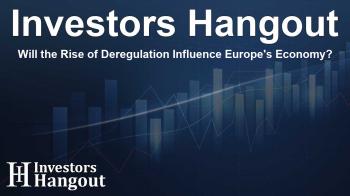Will the Rise of Deregulation Influence Europe's Economy?

The Impact of Deregulation on Europe’s Landscape
In recent times, the topic of deregulation has gained traction, especially with shifts in political climates across the globe. As dynamics change in leadership, particularly with the new US administration pushing for deregulation, questions arise about its implications for other regions, including Europe.
Understanding EU's Position on Deregulation
The new political agenda in the US aims at deregulation, particularly under President-elect Trump’s vision for his second term. This approach has notably boosted US equity markets. However, the European Commission (EC) appears to be walking a different path. While the US prioritizes deregulation, the EU emphasizes what they describe as “simplification.”
The Necessity of Regulatory Simplification
Reports suggest that EU policymakers are not inclined to embrace deregulation. Instead, they aim to cut through legislative complexity while maintaining necessary regulations. According to strategists at Jefferies, this simplification is crucial for investors to monitor closely.
The Commission's focus on balancing environmental measures alongside economic growth underscores its commitment to ensuring a robust framework. The aim here is not to dismantle regulations entirely, but rather to streamline them, fostering a more competitive economic environment.
The Legislative Context in Europe and the US
To grasp the urgency of this situation, consider the legislative landscape. Between 2019 and 2024, more than 13,000 acts were passed by the EU, in stark contrast to approximately 3,500 legislative pieces enacted by the US federal government. This substantial legislative load prompts an evaluation of governance effectiveness within the EU.
Commissioner for Implementation and Simplification
The appointment of Valdis Dombrovskis as the Commissioner for Implementation and Simplification indicates the EU's readiness to tackle its regulatory challenges. Dombrovskis's mission includes substantially reducing reporting requirements for companies, particularly smaller enterprises, which could see cuts as high as 35%.
Tools for Monitoring Regulatory Changes
As the regulatory landscape evolves, investors have several tools at their disposal to monitor changes effectively. The OECD Product Market Regulation indicators and the World Bank’s Doing Business database offer insights into the ease of doing business across Europe. These resources highlight the persistent issue of regulatory burdens that businesses face.
The Impact on Investment
Interestingly, a significant number, about 61%, of companies surveyed by the European Investment Bank in their Annual Investment Surveys identified regulation as a key barrier to long-term investment. This calls into question how simplification efforts might alter the current landscape and whether they could promote a more conducive environment for growth.
Jefferies emphasizes that while simplification may not mirror the aggressive deregulation seen in the US, its effects on competitiveness ought to be examined closely. Investors should particularly focus on upcoming developments outlined in the 2025 Annual Work Programme, expected to provide crucial insights into future regulatory frameworks.
Regulatory Costs and the Path Ahead
One pertinent concern involves the financial strains posed by compliance with EU regulations. The Corporate Sustainability Reporting Directive (CSRD) exemplifies this, with compliance costs ranging significantly, especially for listed companies, where costs can soar to over €1 million.
Consolidating EU’s Regulatory Framework
Recently, Ursula von der Leyen acknowledged the pressing need to reform the existing framework. By consolidating existing regulations into a singular system, the Commission aims to streamline processes and alleviate redundancies while upholding the foundational principles of sustainability.
As we navigate this evolving landscape, the focus will remain on how these measures will shape the European economic environment and potentially impact the presence of initiatives like DOGE within the region.
Frequently Asked Questions
What is the current stance of the EU on deregulation?
The EU is focusing on regulatory simplification rather than outright deregulation, aiming to streamline existing frameworks while maintaining essential regulations.
How does US deregulation affect European policies?
The shift toward deregulation in the US puts pressure on European authorities to enhance competitiveness but leads the EU towards a path of simplification instead.
Who is Valdis Dombrovskis, and what is his role?
Valdis Dombrovskis is the Commissioner for Implementation and Simplification, tasked with reducing regulatory burdens on companies within the EU.
What are compliance costs under the CSRD?
Compliance costs can be substantial, with non-listed firms facing around €150,000 and listed entities exceeding €1 million, indicating a heavy financial burden.
When can we expect further developments in EU's regulatory frameworks?
Investors should look forward to the 2025 Annual Work Programme set for release in early February, which will clarify ongoing regulatory changes.
About Investors Hangout
Investors Hangout is a leading online stock forum for financial discussion and learning, offering a wide range of free tools and resources. It draws in traders of all levels, who exchange market knowledge, investigate trading tactics, and keep an eye on industry developments in real time. Featuring financial articles, stock message boards, quotes, charts, company profiles, and live news updates. Through cooperative learning and a wealth of informational resources, it helps users from novices creating their first portfolios to experts honing their techniques. Join Investors Hangout today: https://investorshangout.com/
Disclaimer: The content of this article is solely for general informational purposes only; it does not represent legal, financial, or investment advice. Investors Hangout does not offer financial advice; the author is not a licensed financial advisor. Consult a qualified advisor before making any financial or investment decisions based on this article. The author's interpretation of publicly available data shapes the opinions presented here; as a result, they should not be taken as advice to purchase, sell, or hold any securities mentioned or any other investments. The author does not guarantee the accuracy, completeness, or timeliness of any material, providing it "as is." Information and market conditions may change; past performance is not indicative of future outcomes. If any of the material offered here is inaccurate, please contact us for corrections.
